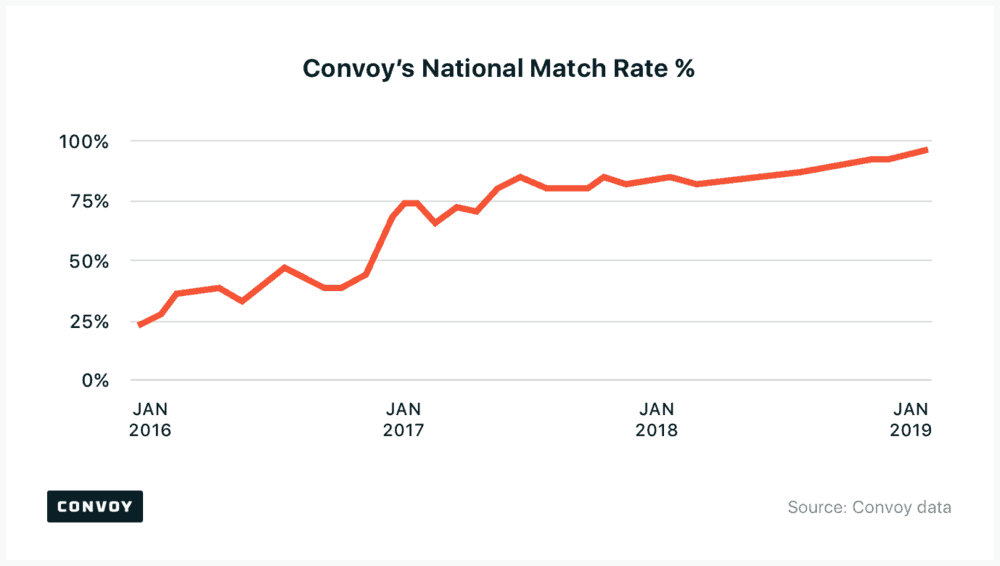Convoy this morning said that it has achieved 100 percent automated matching of loads in its top markets across the country, resulting in no human intervention in the process. The company said that nationally, 95 percent of all loads on its platform are now being matched automatically.
“Automated matching means that no human is involved in finding the carrier that ultimately ends up doing the job,” Ziad Ismail, Convoy’s chief product officer, told FreightWaves. “When we first started Convoy, we found that matching carriers with loads was one of the most labor- and cost-intensive areas of work. It involved calling or contacting multiple companies to figure out who had an available truck and was interested in the particular load. So, it was clear that this was one of the most important areas for us in which to drive automation.”
Routes now seeing 100 percent automated matching include major West Coast markets such as Seattle, Portland and Los Angeles; Midwest routes from Chicago, Cincinnati and Milwaukee; routes from Texas markets such as Dallas, Houston and San Antonio; Northeast routes from New York and Philadelphia; and Southeast routes from Atlanta and others.
Convoy’s platform allows shippers to post loads and drivers or carriers to accept the loads they are most interested in hauling. Using technology to improve this process, Convoy said it has allowed carriers to quickly and easily find and book their desired loads.
The company said it measures booking loads with carriers in two ways – by finding a truck that is available and can arrive on time (matching), and by the carrier and shipper agreeing on the rate at which that work will happen (pricing).
Convoy pointed out that the cost of labor accounts for 65 percent of a typical broker’s expenses, according to DAT data, with a single broker representative making 100 calls to book just 10 loads. By developing a National Match Rate metric, Convoy believes it can reduce costs for shippers, improve earnings for carriers and continue to invest in new innovations.
Ismail explained that Convoy considers pricing and matching as separate functions, and the 100 percent automated matching applies only to the ability of a truck finding a suitable load that it can deliver on time. “We actually have two different teams focused on each of these problems within our product and engineering organization,” he said. “This announcement is focused on our matching milestone. For pricing, we are also sharing that the majority of loads are now also being priced without any human interaction.”

The company attributes this milestone to new features within its app such as No Hassle Detention, Flex Loads and Instant Bidding that have led to an increase in adoption. Ismail said that it is not only these features, though, that have driven app adoption.
“The gains do come from features, but also from important breakthroughs in data and models,” he said. “Data and model improvements are less obvious externally, but it is what many of our team members focus on.”
An example of how data has helped improve the product is the company’s Request a Load feature, which allows carriers to directly share preferences and get them the loads they want with less effort.
“With that feature, we’re enabling app users to directly share their preferences and then more easily get the loads they want,” Ismail said. “It also lowers the effort where the model shifts to where they don’t need to repeatedly look at what is in the marketplace, but we bring them exactly what they want.”
A benefit of automated matching is a reduction in cost, something that Ismail said benefits both sides of the transaction.
“In the traditional brokering model, the broker needs a much larger cut because of all the manual work involved,” he said. “With 100 percent matching automation, we pass the benefits to both sides of the marketplace. Which side we pass it on to depends on the state of the market. There are some cases where there is a shortage of supply and we pass more on to trucks. There are other cases where there is a shortage of shipments and we pass more on to shippers. We also use this to invest in better experiences and innovations for our customers. This includes funding things like Convoy Quick Pay and No Hassle Detention.”
Achieving 100 percent matching did not happen overnight. Ismail said when the Convoy platform first launched, only about 25 percent of loads were automatically matched.
“We got to about 80 percent a year and half ago and then really had to rethink some of our core ideas around matching,” he said. “This is where the team spent a lot of time experimenting with different ideas and talking to drivers. This ultimately led to a new set of innovations that has brought us up to 100 percent.
“There has always been an interesting debate in the industry about how much of the matching could ever be done automatically,” Ismail added. “We’ve always taken the approach that matching is a problem that ultimately is a data science and computer science problem and it was an obvious candidate for automation.”







